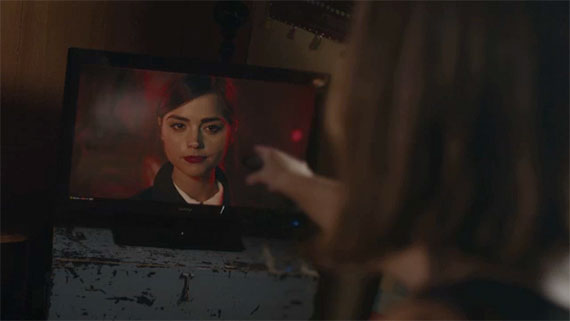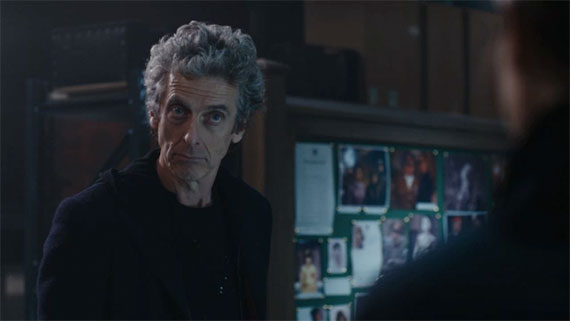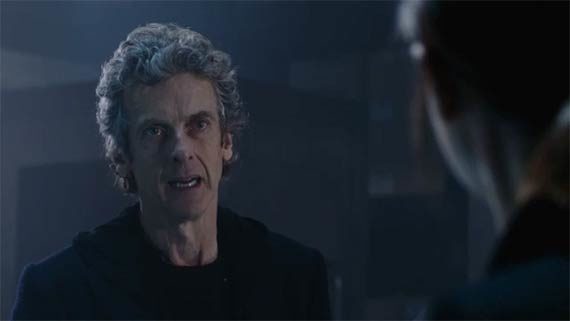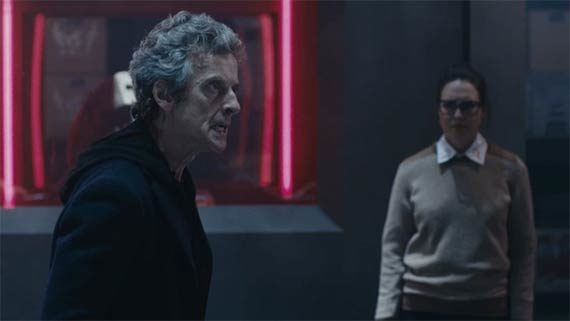12 Great Moments From The Zygon Inversion (Part 2)
Mark McCullough picks out 12 faves from the 8th episode of Series 9.
3. Clara vs Bonnie

In an episode where Clara hardly features, giving the character room to shine and show her competence becomes a difficult task for the writers. This difficultly is compounded by the fact that Clara is actually unconscious trapped within a Zygon pod for the majority of the episode, and when she finally gets out she is relegated to a bit-part player within the key scene of the episode. Yet this episode is actually one of my favourites in relation to how Clara was used. Placed in a vulnerable situation where she has nothing but her wits to keep her alive, she excels. Who else could have the Doctor, communicate to him that they were still alive, and trick Bonnie into going where the Doctor needed her to go, while technically still asleep. I wish I could be so productive! Throughout the previous series, Clara shows that her ability to tell convincing lies is one of her strongest character attributes. In a nice piece of continuity, this scene recognises that and nullifies it in a chilling scene where Bonnie is able to monitor Clara’s pulse to verify if she is lying. (Granted the science behind this is dodgy at best, she would have an elevated heart rate from fear and the stress of the situation anyway, so any variation would have been undetectable).
Bonnie on the other hand is a different kettle of fish, allowing Jenna Coleman the rare opportunity to play an evil character. She absolutely excels managing to make Bonnie and Clara feel like two completely different people: even their postures and tones are different. This takes phenomenal skill on Jenna’s behalf and is something I would hope will be recognised by those tasked with awarding prizes for excellence in acting. Considering the scene where Bonnie faces off against Clara, the tension Jenna creates, in an interaction with herself through the barrier of a television screen is simply unparalleled. Even more impressive is the scene where Clara tries to communicate with the Doctor via winking without Bonnie’s knowledge. Here Jenna is playing Clara, whilst also not playing Clara, that’s almost Tatiana Maslany (Orphan Black) levels of playing multiple characters. The performance here deserves nothing less than being called Jenna Coleman’s best performance to date, narrowly beating the emphatic Dark Water’s
1= Which one are you?

Genuinely, this moment was a real contender for top spot, but right until the last moment I had it sitting in second place. That didn’t do it the justice it deserved, because the message contained within the scene sets it on par with, if not above the phenomenal scene in the Black Archive. My final decision was that it was only fair to introduce the idea of a tied moment so both can have the first place they deserve. Like several moments this week, I am referring to a collection of scenes throughout the narrative, mainly when other characters ask Osgood whether she is Human or Zygon. Of particular note was a scene where the Doctor insisted that he need to know, because it might have been important later: viewers will be aware that it wasn’t suggesting that the only importance was Doctor’s need to know.
The reason this is important and a huge contributor to the episodes success was the commentary it delivered on the world we live in. The Doctor’s need to know represents a general need by society to label people based on things such as race, sexuality and religion. It is my personal belief that labelling actually provides a barrier to acceptance as every label comes with its own associated stereotypes. This inevitably leads to judging people based on what they are rather than who they are, which I feel is one of society’s biggest flaws. This is why I love this aspect of the episode, it tells us that it doesn’t matter who you are: Human or Zygon, Osgood was still Osgood and defining her as either Human or Zygon would have altered the perception of her by both the audience and the other characters in the episode. Let’s face it, the only reason they were asking was to try to figure out if she was the real Osgood, but what the episode asks us to question ourselves on is: What does the real Osgood mean.
On a personal level too, I find the message here very relevant and as such appreciate what Harness and Moffat were trying to do here. As someone who lives in Northern Ireland, religious labelling is a big aspect of our society. The question which one are you is almost asked on a subconscious level daily, and people do try to label you based on your behaviour. If you like Gaelic, you must be Catholic, whereas if you support the Northern Irish football team, you’re probably Protestant. It is quite a backwards way of thinking, and something that The Zygon Inversion addresses perfectly. I found myself after the episode asking why they chose the name, but it’s obvious now. Moffat and Harness used the Zygons to try to invert society’s stereotypes and make people realise that it is the person who counts, not the label. And I can’t convey enough how wonderful that is. I may have used the metaphor for a religious point of view, but it can be adapted to almost any scenario where bigotry towards a particular group can occur: racism, homophobia, sexism etc.
As a bit of an aside, when Osgood asks us to think about it, I prefer to believe she meant the commentary on society. However if you actually do apply logic to the Osgood situation, for a new Zygon duplicate to be produced, the Osgood throughout the episode has to have been the Human template. Not that this affects anything as the introduction of the duplicate restores the question of which is which, we still don’t know who is the Human and who is the Zygon, we can guess based on clothes, but even that is judging based on appearance, which the message of the episode would be very much against.
1= The Black Archives
One moment that spans approximately ten minutes (or more) of screen time left me in a difficult position. It was undoubtedly always going to take top place (either solo or as it ended up shared). My choice was between to keep it grouped as one huge moment, or split it. However the rest of the episode was so good that I knew I couldn’t ignore several deserving contender on this list. That said I could write a full article on twelve great moments within this scene, so I am going to split it a bit into a few sub-moments that I want analyse.

“One of those buttons will destroy the Zygons, release the imbecile’s gas. The other one detonates the nuclear warhead under the Black Archive. It’ll destroy everyone in London. Bonnie. Bonnie, sweetheart! One of those buttons will unmask every Zygon in the world. The other one cancels their ability to change form. It’ll make them human beings for ever. There are safeguards beyond safeguards. I did this on a very important day for me and this ceasefire will stand. “
Fair warning, there’s going to be a lot of quotes in this section of the article, because that speech from the Doctor just stole the show. This bit sets the scene for both characters involved in the decision by presenting them with a choice between what they want, and their worst nightmare. This sufficiently raises the stakes and creates a scenario where the Doctor (acting as a cheesy gameshow host) has control. As he himself professes the scenario is a “scale model of war”. He goes on to comment about the nature of war, and how those who make the decisions can have no real way of knowing what consequences their choice might have. It is an incredible piece of storytelling by Moffat and Harness to take something as complex as war and simplify it to such an extent, yet still maintaining the necessary context. And on remembrance weekend they do so with the upmost respect.

“These things have happened, Zygella, they are facts. You just want cruelty to beget cruelty. You’re not superior to people who were cruel to you, you’re just a whole bunch of new cruel people. A whole bunch of new cruel people being cruel to some other people, who’ll end up being cruel to you. The only way anyone can live in peace is if they’re prepared to forgive. Why don’t you break the cycle?”
Another commentary on the real world and the problems faced on a regular basis proving that both writers were on top form when creating this scene. Why I’ve chosen to draw out this particular quote as one of the key points of the scene is not because of the huge aspects in relation to war. It’s the more personal side that it can also equate to: bullying. Doctor Who’s target audience is the family. That means that children will be watching, and if this dialogue can even reach out to one kid who has been cruel to another, then it becomes one of the most meaningful pieces of advice the show has delivered. Going back to the bigger picture and the discussion about War, the Doctor goes on to slam Bonnie for the lack of thought that she has put into what comes next, the fact that she will face rebels like herself in a never ending cycle. Coming from a man with the experience of the Doctor, this delivers a very strong message indeed. In short a very impactful section of the dialogue, but one that gets overlooked as the best is yet to come.

I don’t understand? Are you kidding? Me? Of course I understand. You mean, you call this a war? This funny little thing? This is not a war! I fought in a bigger war than you will ever know. I did worse things than you could ever imagine. And when I close my eyes… I hear more screams than anyone could ever be able to count! And do you know what you do with all that pain? Shall I tell you where you put it? You hold it tight… till it burns your hand, and you say this… No-one else will ever have to live like this! No-one else will have to feel this pain! Not on my watch!
And now we come to this, and I’m not kidding when I say that it is the best single moment the show has produced in its history. Looking at a wider picture of the entirety of the revived series, we know that the Doctor has been carrying the weight of the Time War the whole time. We are treated to rare glimpses of the effect that it has on him, but nothing is as revealing as this. The Doctor we see here is still raw (which is surprising after the events of The Day of Doctor). My favourite aspect of this scene is the fact that the Doctor uses his pain for good, and only reveals the extent of it when someone else can benefit from doing so. This is the type of behaviour that is so typical of the Doctor, and in terms of Doctor defining moments, I challenge anyone to find me one that just gets the character as much as this one. I have seen people calling for Harness to be the next showrunner, and after this performance, I can say with certainty that if this did happen the character of the Doctor would be in very safe hands.

“Because I’ve been where you have. There was another box. I was going to press another button. I was going to wipe out all of my own kind — man, woman and child — I was so sure I was right.”
The final quote I want to discuss is this one which essentially makes The Zygon Inversion the second part to two stories: The Zygon Invasion and The Day of the Doctor, explaining the Moffat co-write. In truth as a sequel, it manages to exceed the quality of both prequels, which considering the resounding success of the fiftieth anniversary special, that is quite the achievement. It doesn’t just match The Day of the Doctor in terms of narrative, it aligns itself thematically too. The Doctor’s willingness to forgive Bonnie and give her another chance typifies the promise of “Never cruel or cowardly, never give up, never give in.” Capaldi’s Doctor was my favourite before Saturday anyway, now he is miles ahead and this scene is largely the reason. A quote I haven’t actually mentioned yet is a line in passing from the Doctor about how the entire exchange had happened fifteen times, suggesting that in the previous fourteen either Kate or Bonnie had hit a button, so the situation has to be reset: this certainly explains the lengths the Doctor went to this time. Thinking about it, he must have been emotionally exhausted by the end of it, having to go through that fifteen times.
Also touched on towards the end of the scene in the Black Archives is the impact Clara has had and continues to have on the Doctor. This was reaffirmed in the final scenes of the episode where the Doctor comments that the time without her felt a lot longer than it was (a moment which narrowly missed out making the list). With Clara’s imminent departure, this does not bode well for our Time Lord’s mental state when she does. Exciting times are coming in terms of the Doctor’s characterisation and I for one cannot wait.
Conclusion
Given the sheer volume of coverage I have given this episode I felt the need to give the article a conclusion. Quite simply I have never come away from an episode of Doctor Who as impressed as I did this week. I’ve also never come away from an episode with so much to think about, and so many talking points that I wanted to get stuck into. That’s the reason this article ended up so long, and there is actually more I could have said. So if you actually made it this far, congratulations, I appreciate it. I hope you all enjoyed the episode as much as I did, although that does leave me in the position where I know next week won’t be able to reach the bar set by this week. Here’s hoping I’m wrong, especially as it looks like a particularly creepy episode. I’ll end the article with a massive congratulations to Peter Harness for a stellar script: it would be an absolute travesty if it was his last.








